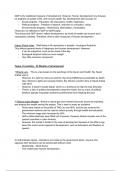Summary
A Level Geography - Health, Human rights, and development - Summary revision notes
- Institution
- PEARSON (PEARSON)
Summary revision notes for Geography - Health Human rights, and development with all case studies - Pearson Edexcel specification
[Show more]



